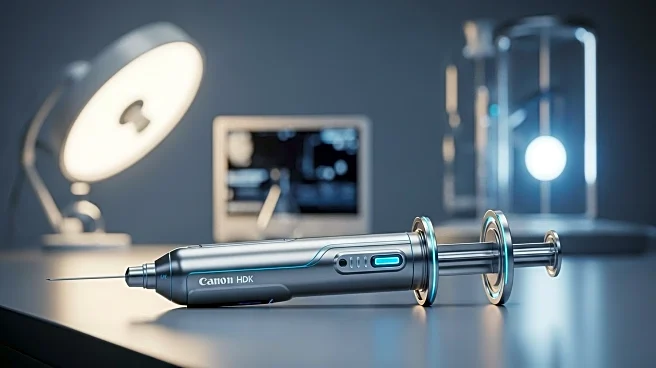What's Happening?
Jiangsu Hengrui Medicine is expanding its focus into the atopic dermatitis (AD) market by developing novel immunomodulatory therapies. The company is leveraging proteolysis-targeting chimeras (PROTAC) technology to create treatments that promise reduced toxicity and enhanced efficacy. Their pipeline includes HRS-5041, a Phase II-ready androgen receptor antagonist initially developed for prostate cancer, now being explored for its potential in modulating immune pathways in AD. Additionally, KT-621, a STAT6 degrader developed in collaboration with Kymera Therapeutics, is advancing into Phase I trials. This dual approach targets both androgen receptor and STAT6, addressing the complex immunopathology of AD. The AD market is projected to grow at a compound annual rate of 7.11% through 2033, favoring treatments with low toxicity.
Why It's Important?
The expansion into atopic dermatitis by Jiangsu Hengrui Medicine represents a strategic move in a high-growth therapeutic area. The focus on low-toxicity treatments aligns with market trends, as patients and healthcare providers prioritize therapies with favorable safety profiles. The use of PROTAC technology to target 'undruggable' proteins is part of a broader industry shift, valued at over $15 billion in 2025. Success in this area could redefine the AD treatment landscape, offering new options for patients suffering from this chronic condition. However, the company's success hinges on the outcomes of Phase I/II trials for KT-621 and HRS-5041, which will be critical in validating their safety and efficacy.
What's Next?
Jiangsu Hengrui Medicine's next steps involve navigating the clinical trial process for its AD candidates. The Phase I data for KT-621, expected in late 2025, will be crucial in establishing its safety and efficacy. Similarly, HRS-5041's transition from oncology to dermatology requires robust clinical evidence to justify its repurposing. The company's ability to overcome these hurdles will determine its long-term success in the AD space. Investors and stakeholders should closely monitor the trial results, as they could significantly impact the company's position in the competitive AD market.
Beyond the Headlines
The development of novel therapies for atopic dermatitis by Jiangsu Hengrui Medicine highlights the ethical and scientific challenges in drug repurposing and targeting complex diseases. The use of PROTAC technology to degrade specific proteins offers a promising avenue for addressing diseases with limited treatment options. This approach not only aims to improve patient outcomes but also reflects a shift towards more personalized and precise medicine. The success of these therapies could lead to broader applications in other immune-inflammatory conditions, potentially transforming treatment paradigms across multiple therapeutic areas.









